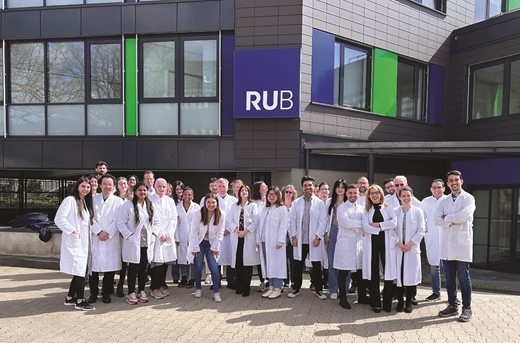-
PDF
- Split View
-
Views
-
Cite
Cite
Judith Ozkan, Investigator Nazha Hamdani MD, PhD, talks to CardioPulse about her love of science and why we may be closer than we think to unravelling a clinical conundrum, European Heart Journal, Volume 44, Issue 32, 21 August 2023, Pages 3031–3033, https://doi.org/10.1093/eurheartj/ehad311
Close - Share Icon Share
Prof. Hamdani is chair of the Cellular and Translational Physiology Department at the Medical Faculty, Ruhr-Universität Bochum, Germany and head of Molecular and Experimental Cardiology at the Institute for Research and Teaching at St. Josef Hospital, Ruhr-Universität Bochum, where her team are focused on understanding the underlying mechanisms of heart failure (HF) with preserved ejection fraction (HFpEF). Her team are currently investigating treatment options on a patient-by-patient basis focusing on understanding all the variables involved in HF (Figure 1).

What influenced your choice of career?
The main motivator for me personally is a life-long interest in science and a desire for intellectual challenges. Science stimulates the curiosity of how things work and represents a desire to seek out and consume scientific information just for the pleasure of it. It’s related to curiosity, and people who are science curious do this because they take satisfaction in seeing what science does to resolve mysteries or problems or answer questions. Only with science and research can we essentially answer the big questions and offer a strong understanding of the world we live in, independently of whether it’s cardiology, or physics or chemistry. It simply affects every aspect of our life from the food we eat to the technology we use and the natural world that surrounds us. I don’t think I can do anything else other than being a scientist.
You are known for your work around HFpEF, how do you see this field developing in the future?
Over recent years, we have collected a lot of information about the mechanisms of the disease but there is still a lot more to uncover especially in relation to the sub-types of this condition. HFpEF is a complex syndrome at the crossroads of multiple co-morbidities, age, sex, and many other things. We were very effective in treating HF with reduced ejection fraction (HFrEF) and reducing mortality and morbidity ranges by about 40% using common treatment irrespective of the aetiology. Unfortunately, the same treatment for HFrEF hasn’t been so successful for HFpEF. We need to put more effort into understanding the pathophysiology of this type of disease which depends largely on sub-dividing HFpEF patients into subgroups, based on comorbidity, age, sex differences, and also ejection fraction and trying to understand the pathophysiology of each subgroup to find the target. Accordingly, we will be able to personalise treatment approaches and better manage the patients of tomorrow. Clinicians are often confronted with these types of patients and have little guidance on how to effectively diagnose and manage them as diagnosis of HF phenotypes is very challenging because the symptoms are not specific and can be explained by several alternative conditions. If we deepen our understanding of the phenotypes and the pathophysiology associated with comorbidities, age, sex, and ejection fraction in order to provide a firm foundation for clinician innovation, we will definitely solve this mystery (Figure 2).

What is your group working on at the moment?
The programme that I’m setting up now aims to translate our findings from the lab to clinical development. So essentially from bench to bedside and then from bedside to bench based on observations and questions from clinical practise. At Ruhr-Universität Bochum, we are bridging the gap between basic research and clinical application, so between cardiovascular, biological and therapeutic interventions. We would like to take a deeper look at the basic pathophysiology of HF overall by building on the understanding of the interplay between inflammation, oxidative stress, and HF. We hope to develop more effective treatment options and drugs for patients with existing heart problems and comorbidities. We are particularly interested in reducing cardiovascular deaths amongst disadvantaged groups of people and ethnic minorities. We also have ambitious plans to set up a new translational cardiometabolic research centre focusing on the characterisation of cohorts of patients with cardio metabolic disease, especially HFpEF, diabetes, metabolic syndrome, and arterial hypertension by means of a cardiometabolic study of out-patients. The cardiometabolic research centre will investigate cardiovascular and metabolic diseases and in particular the complex relationship between cardiological and coronary HF and metabolic diseases. This is an interdisciplinary and cross-site approach to maximise the research potential of as many clinics within the Ruhr-Universität Bochum as possible and will make a significant contribution to the understanding, prevention, and treatment of cardiometabolic risk factors, diseases, and research into the underlying patho-mechanism. We also hope to raise awareness of the interdisciplinary complexity of cardiometabolic diseases and, ultimately, to establish pre-clinical and clinical institutes within the medical faculty and promote innovative diagnostics. This amazing centre will change our conception of how we see things and guide us to the missing understanding in cardiometabolic disease, specifically in HFpEF, and I can say with great confidence that we will blow open the secret of metabolic diseases.
Which institutions have been important to you in your career?
The Ruhr-Universität Bochum is the place where I grew up scientifically and the place that offered me the facilities to further develop my skills and knowledge. I also include the Institute of Physiology, and the Institute of Education and Research at St. Joseph Hospital that contributed heavily to our discoveries over the last years. Thanks to the support of the Dean and Rectorate offices at our university who are pushing to facilitate great science and translational medicine, we have been able to create and uphold high standards for the faculty, the staff, and also for the students in a positive work and learning environment.
Any advice for the next generation of scientists?
Understand your research branch and that scientists require first inspiration and then aspiration in the research field. Scientists need to understand how to develop a relevant question and then formulate and test a hypothesis. Knowing how to effectively prepare and interpret data and the ability to be analytical to understand your data is extremely important. Also, be aware and inform yourself of the regulatory guidelines to understand the framework that guides you to successful science. Develop your leadership skills and build a strong multidisciplinary team. Know how to communicate with different audiences, either scientists or non-scientists. Most important, is looking for funding because without that you can’t do anything. Don’t forget to translate your findings into meaningful steps for the patient and remember, we are not just doing science for the sake of it. Enjoy your work because science is a joy.
Author notes
All correspondence relating to this paper should be sent to: [email protected]
Conflict of interest: All authors declare no conflict of interest for this contribution.



